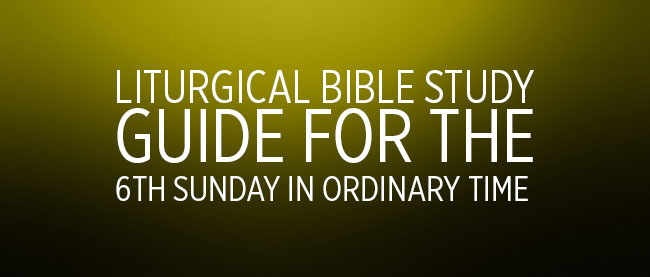1st Reading – Sirach 15:15-20
The author of Sirach was Jesus, the son of Eleazar, of the family of Sirach. He was by profession a teacher of Wisdom in Jerusalem. Sirach wrote during the early decades of the 2nd century before Christ, just prior to the Maccabean wars. During this critical period of Jewish history, when the Chosen People were in danger of becoming Hellenized and paganized, he stoutly champions the old religion and its sacred books, and shows how its lessons are applicable to every circumstance in life. In order to make his readers proud of being Jews, he eulogizes the heroes of Israel from Noah to Simon (the Greek spelling, Simeon the Hebrew spelling) the High Priest.
The wealth of practical wisdom contained in the book of Sirach won for it the honorable title of Ecclesiasticus, as it is called in the Douay-Reims translation, which means “Ecclesiastical Book” or “Church Book” and for its author, the surname of “The Pedagogue” (The Schoolteacher). It appears to have been much used in the early Church as a textbook for the instruction of catechumens (candidates for baptism).
2nd Reading – 1 Corinthians 2:6-10
Last week we heard Saint Paul address how his preaching illustrates the fact that man’s strength and wisdom are nothing compared to those of God. Today we hear him tell of the true wisdom of God.
Gospel – Matthew 5:17-37
We are still at the Sermon on the Mount. Jesus has delivered it and is now applying the beatitudes to the hearers of the sermon. The verses we hear today give the basic legal principles of the sermon. They are the most controversial verses in Matthew because no major Christian church requires observance of all 613 precepts of the Old Testament law, both ethical and ceremonial, but only the ethical commands such as the 10 commandments and the commands to love God and neighbor. In the initial encounter of the Gospel with Judaism, as well as in those primitive churches that were entirely or largely Jewish in membership, the attitude of Jesus and the Church to the Law was an urgent question. The Law had a sacredness and a saving value in Pharisaic Judaism. The Law was thought to be the summary of all wisdom – human and divine, the revelation of God Himself, a complete and a secure guide of conduct and endowed with a sacramental assurance of good relations with God.
Bible Study Guide from Fr. Cielo Almazan


